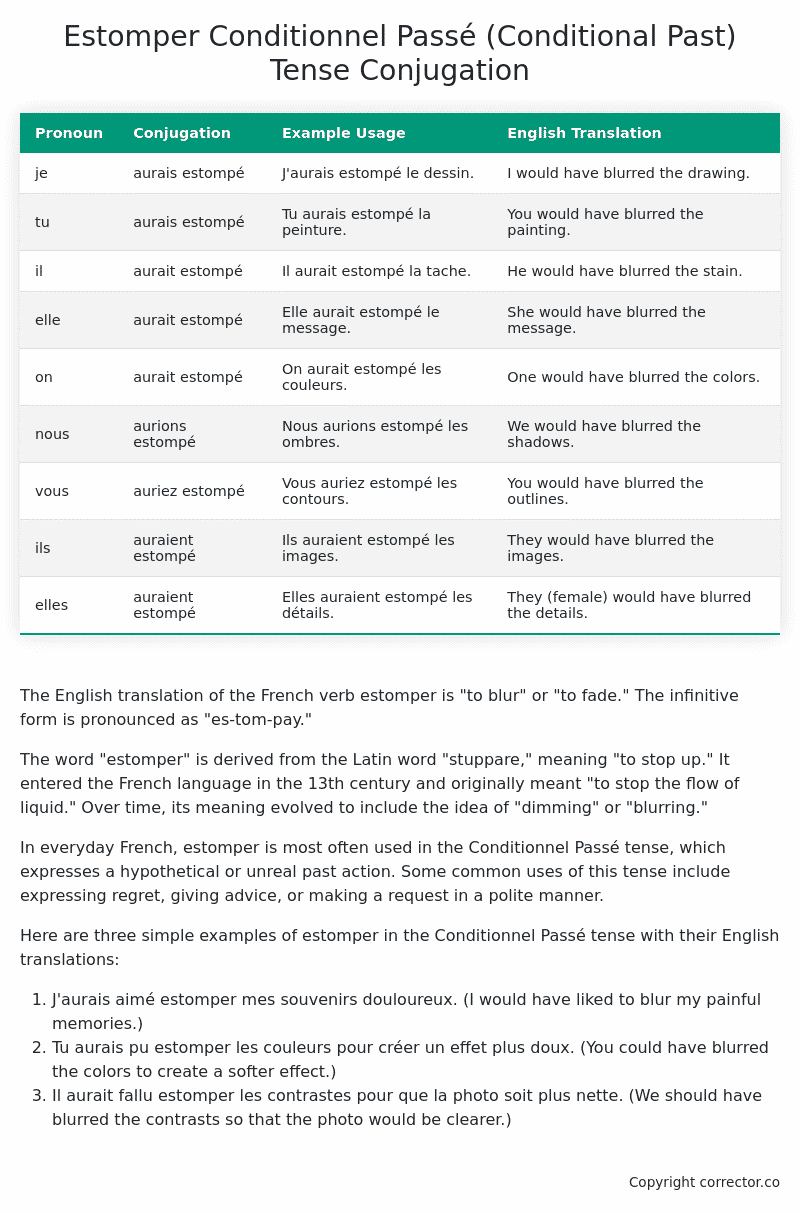Conditionnel Passé (Conditional Past) Tense Conjugation of the French Verb estomper
Introduction to the verb estomper
The English translation of the French verb estomper is “to blur” or “to fade.” The infinitive form is pronounced as “es-tom-pay.”
The word “estomper” is derived from the Latin word “stuppare,” meaning “to stop up.” It entered the French language in the 13th century and originally meant “to stop the flow of liquid.” Over time, its meaning evolved to include the idea of “dimming” or “blurring.”
In everyday French, estomper is most often used in the Conditionnel Passé tense, which expresses a hypothetical or unreal past action. Some common uses of this tense include expressing regret, giving advice, or making a request in a polite manner.
Here are three simple examples of estomper in the Conditionnel Passé tense with their English translations:
- J’aurais aimé estomper mes souvenirs douloureux. (I would have liked to blur my painful memories.)
- Tu aurais pu estomper les couleurs pour créer un effet plus doux. (You could have blurred the colors to create a softer effect.)
- Il aurait fallu estomper les contrastes pour que la photo soit plus nette. (We should have blurred the contrasts so that the photo would be clearer.)
Table of the Conditionnel Passé (Conditional Past) Tense Conjugation of estomper
| Pronoun | Conjugation | Example Usage | English Translation |
|---|---|---|---|
| je | aurais estompé | J’aurais estompé le dessin. | I would have blurred the drawing. |
| tu | aurais estompé | Tu aurais estompé la peinture. | You would have blurred the painting. |
| il | aurait estompé | Il aurait estompé la tache. | He would have blurred the stain. |
| elle | aurait estompé | Elle aurait estompé le message. | She would have blurred the message. |
| on | aurait estompé | On aurait estompé les couleurs. | One would have blurred the colors. |
| nous | aurions estompé | Nous aurions estompé les ombres. | We would have blurred the shadows. |
| vous | auriez estompé | Vous auriez estompé les contours. | You would have blurred the outlines. |
| ils | auraient estompé | Ils auraient estompé les images. | They would have blurred the images. |
| elles | auraient estompé | Elles auraient estompé les détails. | They (female) would have blurred the details. |
Other Conjugations for Estomper.
Le Present (Present Tense) Conjugation of the French Verb estomper
Imparfait (Imperfect) Tense Conjugation of the French Verb estomper
Passé Simple (Simple Past) Tense Conjugation of the French Verb estomper
Passé Composé (Present Perfect) Tense Conjugation of the French Verb estomper
Futur Simple (Simple Future) Tense Conjugation of the French Verb estomper
Futur Proche (Near Future) Tense Conjugation of the French Verb estomper
Plus-que-parfait (Pluperfect) Tense Conjugation of the French Verb estomper
Passé Antérieur (Past Anterior) Tense Conjugation of the French Verb estomper
Futur Antérieur (Future Anterior) Tense Conjugation of the French Verb estomper
Subjonctif Présent (Subjunctive Present) Tense Conjugation of the French Verb estomper
Subjonctif Passé (Subjunctive Past) Tense Conjugation of the French Verb estomper
Subjonctif Imparfait (Subjunctive Imperfect) Tense Conjugation of the French Verb estomper
Subjonctif Plus-que-parfait (Subjunctive Pluperfect) Tense Conjugation of the French Verb estomper
Conditionnel Présent (Conditional Present) Tense Conjugation of the French Verb estomper
Conditionnel Passé (Conditional Past) Tense Conjugation of the French Verb estomper (this article)
L’impératif Présent (Imperative Present) Tense Conjugation of the French Verb estomper
L’infinitif Présent (Infinitive Present) Tense Conjugation of the French Verb estomper
Struggling with French verbs or the language in general? Why not use our free French Grammar Checker – no registration required!
Get a FREE Download Study Sheet of this Conjugation 🔥
Simply right click the image below, click “save image” and get your free reference for the estomper Conditionnel Passé tense conjugation!

Estomper – About the French Conditionnel Passé (Conditional Past) Tense
Formation
Common Everyday Usage Patterns
Expressing Unreal Past Scenarios
Polite Requests or Suggestions
Expressing Doubt or Uncertainty
Interactions with Other Tenses
Conditional Present
Indicative Past Tenses
Conditional Future
Summary
Want More?
I hope you enjoyed this article on the verb estomper. Still in a learning mood? Check out another TOTALLY random French verb conjugation!


